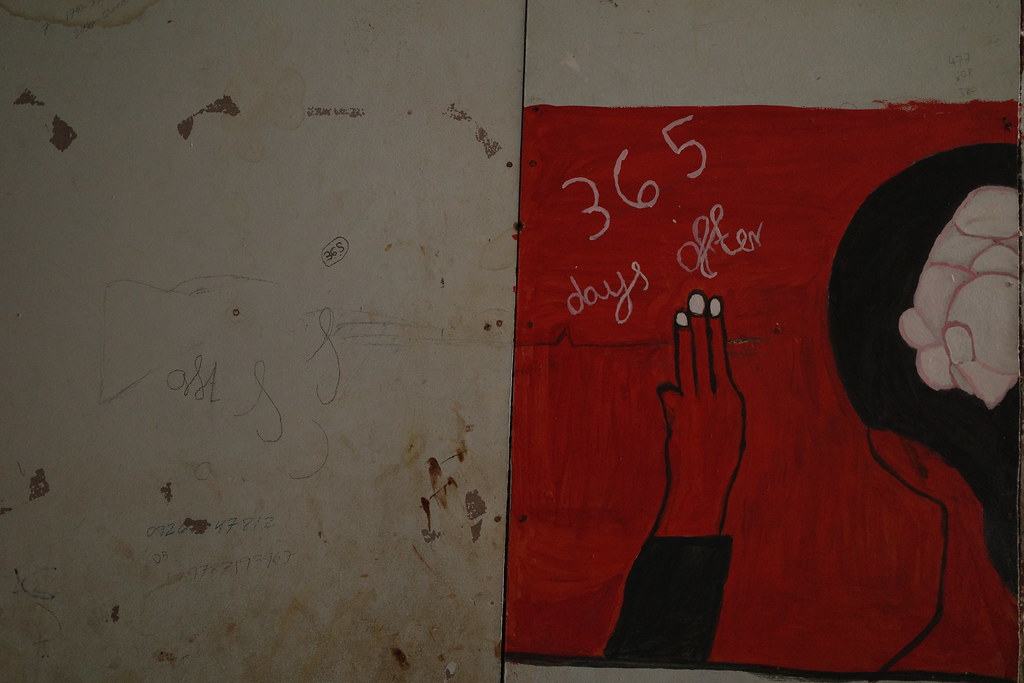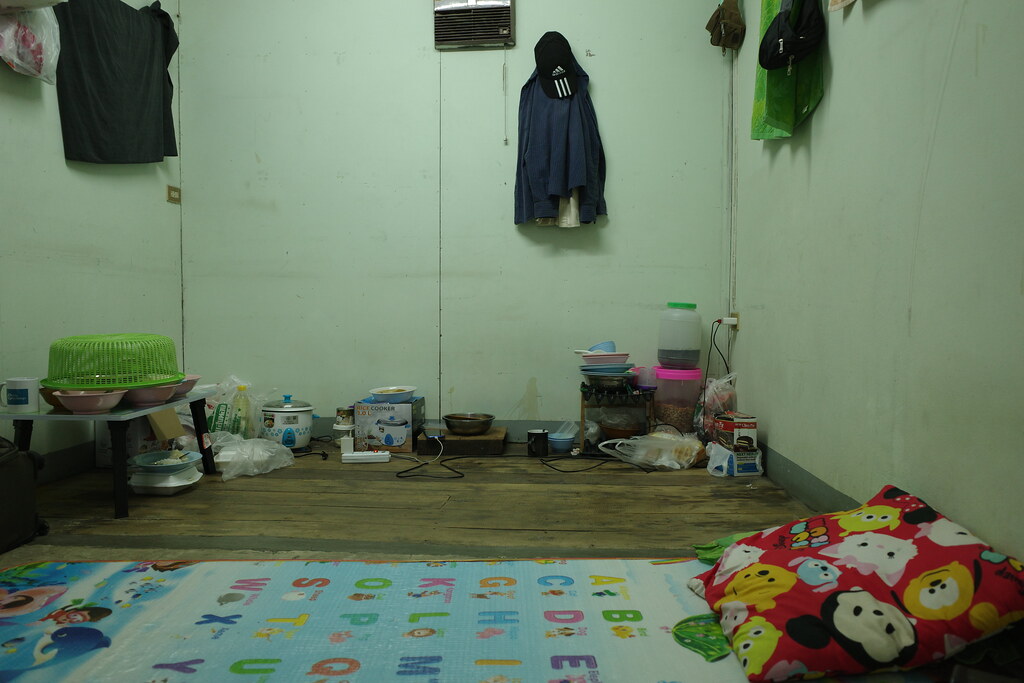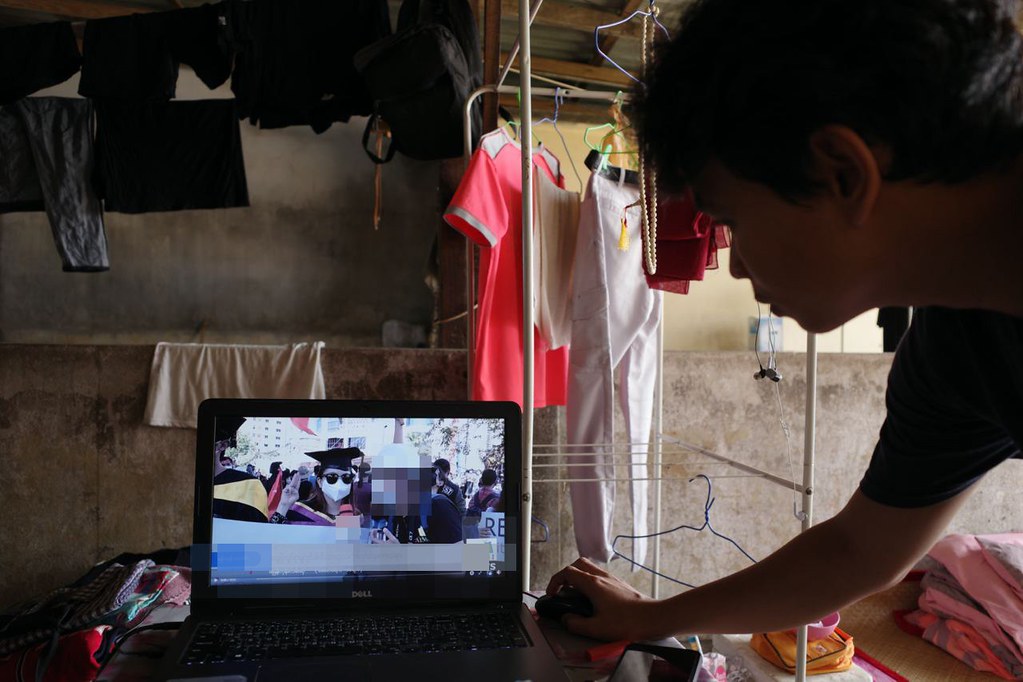The use of violence by the Myanmar government after the 2021 coup in suppressing the people has resulted in a great number of Burmese people running for their lives to Thailand. Some came in legally with valid visas, some are undocumented. Although this group of people do not have a clear status as refugees like those living in temporary camps, living among ordinary people in the city makes them no different from urban refugees.
Information from The Coalition for the Rights of Refugees and Stateless Persons which summarises the refugee situation in Thailand in 2021 – 2022 indicates that there are around 5,155 urban refugees in Thailand. This number includes refugees of other nationalities, while urban refugees from Myanmar may even be higher than the estimate, since after the 2021 coup, many Burmese people who cannot be detected fled to Thailand. Some areas have Burmese who themselves have arranged safehouses or refuges.
Life in a safehouse is not safe

The anti-Burmese government signs read
“The Spring Revolution started from the CDM (Civil Disobedience Movement).
The Spring Revolution was born from protests and demands.
The Spring Revolution can continue forward because of the PDF (People’s Defence Force)”
An elderly man wearing a Burmese sarong sits in front of a row of buildings. Behind this Ah Ko (a term in Burmese referring to an older man) is a large, eye-catching piece of cloth. The terms “CDM” and “PDF” in the slogans would tell people who knows of the Myanmar coup that these buildings may have some connection to the anti-coup protests in Myanmar.
The 64-year-old Ah Ko looks after the 3-storey row of buildings. A total of 27 people live inside, using it as a safehouse for Burmese who disagree with the coup led by the Burmese army. The people living in this safehouse are both elderly and young people.




Inside the safehouse

A bedroom on the safehouse's rooftop
On the first floor, the front of the building is used to accept guests, the back is for cooking and in part of the middle are beds covered with green and pink mosquito nets. Since the number of people living here exceeds the number of bedrooms, each bedroom has 5-6 people sleeping together. Some who don’t want to squeeze in among the others sleep on the rooftop. This safehouse is considered to be a waiting area (a temporary place to live) for any Burmese who have just arrived in Thailand while they are trying to find a new place to live or for those waiting to migrate to a third country.
The Ah Ko told us that this safehouse has helped Burmese from many areas. “The ordinary people who no longer have anywhere to live, who can no longer live in Myanmar, and leading members that fought against Senior General Min Aung Hlaing’s coup. Some are PDF, some are politicians. Most aren’t always here. People are always coming and going. All expenses are supported by a Burmese network in America. They raise money and send it to us.”

The Ah Ko
In truth, the Ah Ko is someone who could easily move to a third country, since his family moved from Myanmar and settled down in America during the “Saffron Revolution” in 2007. Then in 2016, he chose to return to Myanmar after Aung San Suu Kyi’s NLD party won the election in 2015 and took more than half of the parliament and senate seats, giving these that had gone far away from home hope for the country of their birth. He chose to return and open a tourist business in Myanmar by himself, while the rest of his family members remained in America. Then another coup occurred in 2021.
“I’ve already been to a third country, why would I need to go again? When I lived there, I’d already survived. I can eat, I can live, but our brothers and sisters, our people, are still living in difficulty like this. Will I close my eyes and leave? So I decided to not go to a third country. I will stay and help as much as one human can, so I decided to continue to stay here (Thailand) and help raise money to help our brothers and sisters,” the Ah Ko said.
He views the 2021 coup as different from the 1988 protest against General Ne Win (also known as the 8888 Uprising on 8/8/1988) when people still had no internet access and did not know of the protests. But in 2021, every child has the internet and can contact each other, and the CDM and PDF were formed.
“If in 1988 the military shot 10 people, another 100 people would go quiet. No one would’ve been brave enough to fight. But in 2021, the military shot down 100 people, and there would be 100 people, 1,000 people, 10,000 more. In 2021, all the kids have their eyes and ears open wide. They are able to find out everything that is happening and show it to the whole world,” the Ah Ko said.
Entering Thailand quietly without getting any official recognition of status from the Thai government, from the Ah Ko’s point of view:
“If I can, I would like to ask the Thai government to accept us and set up a centre for war refugees. The people who come here aren’t evil people. The coup soldiers abused their powers to shoot the people, kill the people, destroy the people’s things. People that have nowhere to live have to escape here. Coming here is a secret business. If we are caught, we have to pay. If sent back to Myanmar, the risk is the same as sending them to die. If possible, I would like the Thai government to solve this problem directly. Accept us openly. Open a centre for war refugees. If the situation in their country improves, have them go back," the Ah Ko said.
From ‘journalist’ to ‘refugee’

Thu showing us an MV he edited for a Burmese artist
Thu (alias) is one of the people living in Ah Ko’s safehouse. In Myanmar, he worked as a journalist. Originally, he was a cameraman and video editor, but since he worked in a small news agency when there was a lack of resources, he moved in front of the camera and carried out field reporting during the anti-coup protests in Myanmar. Thu said that he did not agree with the coup.
“I don’t agree. In the past, in our country, everyone was able to communicate everything according to our rights. After the coup the military claimed that there was fraud in the elections but had no evidence to show to the people. Two people that disagreed with the coup were shot. I thought, no country uses weapons or guns to threaten the people,” Thu said.
When he was still in Myanmar, Thu was part of a team of journalists who reported on the protests. “The soldiers ordered us to stop, we were not allowed to shoot videos there. Some people didn’t listen and kept taking photos and videos, and they were arrested.” The reporting which caused Thu’s news agency to be shut down was during the COVID-19 situation. The hospitals did not have enough oxygen tanks, but the military had given oxygen tanks to people who supported the military first while those opposing the coup did not get any. After the news was published “the soldiers hunted us down, we couldn’t stay and had to escape here.”
“The risk for journalists in Myanmar right now is very high because most journalists are in prison. The military controls all the news,” Thu said.

Thu plays a video of him interviewing an anti-coup protestor during a field report
Before entering Thailand, Thu had to stay with friends or acquaintances and change houses every 3-4 days before he contacted the Ah Ko and sold his personal camera for money to cross the border with his girlfriend. After entering the safehouse, Thu had to stay silent and live quietly so as to not get arrested, since he had entered the country without papers. He has already successfully submitted a request to go to a third country, which is currently the only hope for him and his girlfriend as they can no longer return to their home country in the current situation.

Thu and his girlfriend’s matching rings
While waiting to move to another country, living in Thailand requires money. But since he has no documents, it is difficult for him to move around in Thailand. Just like when he walks out of the safehouse to buy groceries – if he comes across a policeman on a motorcycle passing by, he would already be scared of getting arrested. Thu has been in Thailand for 4 months, and his outward appearance has clearly changed. He is a lot skinnier compared to the photo he took when he was in Myanmar. “I know well how much I changed. At home I had my mum to prepare me food, but after coming here (Thailand), life is not comfortable. We don’t have any papers, we can’t live happily, we always have to be careful. Sometimes I regret it and think of many things. I try to think that I have to survive, because one day our country will go back to what it was before.”
When we asked him if he could make one wish what would it be, Thu answered, “If I can, I only wish for democracy to be returned to us.”

How should the lives of “urban refugees” be managed?
Throughout the 2 years since the Myanmar coup, the Thai government, as a neighbouring nation, has not had any screening system in place for Burmese refugees. Sirada Khemanitthathai, of the Faculty of Political Science and Public Administration, Chiang Mai University, an expert on Myanmar, views the 2-year-old Myanmar coup in terms of its relation to Thailand. Currently, the Burmese people living in Thailand are not just labourers. After the coup, people from a diverse range of groups, classes and skills entered the country, since Thailand is safer for them compared to Myanmar. The Thai government should therefore respond to the current situation and protect the lives of the Myanmar people.
Sirada also said that after the coup, many middle class Burmese migrated into Thailand, allowing us to see Burmese people buy condominiums in the centre of Bangkok. They also send their children to attend international schools, and many CDMs are studying in both state and private Thai universities. Economic capital also followed them into the country. If we view this in terms of human resources, those that migrate into Thailand have skills, education and capital. Thailand can benefit from this rather than just letting them live in hiding.
Sirada suggested that a good approach to taking care of Burmese urban refugees is for the Thai state to issue a policy which supports refugee status for Burmese people who fled due to the political situation (forced migration). For example, this group of people could be allowed to register legally and receive protection under Thai law, to prevent any corruption by state officials that urban refugees may encounter.
“What we want is to have policies which open channels for people displaced because of persecution to register for protection under Thai law, so that they can avoid receiving protection through unofficial channels by local-level Thai authorities. The Thai government may think that if we have a policy that is too good, it may attract more people to come. This is the thinking of the security agencies, but actually, with Myanmar’s current situation, they would still leave anyway. The push factors from the political situation are very strong,” Sirada said.
Political factors in Myanmar force a large number of their people to escape to Thailand as political refugees. Since the people need to leave, they may choose to bribe Thai state officials or the police in order to survive and provide themselves with some sort of protection in their lives.
Sirada said that some educated people, despite having skills, would disguise themselves as labourers in order to survive in Thailand, since they cannot return to their country of origin. If the Thai state sees the potential here rather than worry about security issues, it would help Burmese refugees in Thailand to live more normally and not have their rights violated again and again.


